Joseph Pascale è un giornalista americano, direttore del sito internet . Il suo sito, che si occupa di vino, gastronomia e curiosità dalla Toscana e dall'Italia, ha poco tempo fa ospitato un lungo pezzo sull'attività di Ernesto de Pascale. Il Popolo del Blues pubblica adesso il suo report dal festival di musica e cinema di Loreto, che ha visto coinvolti i più importanti musicisti, compositori e arrangiatori italiani nel campo della musica per film.
A Festival of Italian Film Music in Loreto
I began my drive to Loreto at nine o'clock on that late October morning and arrived at my hotel just before one o'clock in the afternoon.
The reason for this journey was to attend Musica Per L'Immagine: Festival Internazionale Musiche da Film, a three-day festival of live performances of music in Italian cinema. Performing at this event would be some of the musicians and composers whose work is an important part of the fabric of Italian cinema music history. The music of Nino Rota (Federico Fellini's La Strada, Franco Zeffirelli's Romeo and Juliet and Francis Ford Coppola's The Godfather), Ennio Morricone (Sergio Leone's Dollars trilogy, Once Upon a Time in the West and Once Upon a Time in America, as well as the soundtracks to The Mission and Cinema Paradiso), Piero Piccioni and others were part of the play list at each concert. A segment of the festival focused on the music of the unforgettable music of the Italian Westerns.

Loreto is a small town built on an ancient hill filled with laurels. It is a community of 12,000 inhabitants and is wealthy in artistic, religious and cultural heritage. Loreto is legendary for a sanctuary in the center of town at the top of the hill. In 1291, the Muslins drove the crusaders out of Palestine and Christians did all they could to salvage anything relating to the life of Jesus, Mary, and the apostles. They tried to obtain the Holy House of the Madonna in Nazareth, where she was born and lived and where she received the annunciation of the Arch Angel Gabriel. The legendary story is that the stones of Mary's house were taken from Nazareth, transported to Croatia and then taken to Loreto in 1291 and rebuilt where it remains today.
It is estimated that four million pilgrims come to Loreto each year to visit the Holy House. Some of the famous pilgrims include Christopher Columbus, Galileo Galilei, Casanova, Miguel Cervantes, Michel Montaigne, Queen Christine of Sweden, Napoleon Bonaparte, Wolfgang Amadeus Mozart, Joaquim Murat, Stendhal, Voltaire, Pope John XIII, Pope Paul VI, Pope John Paul II, and Mother Teresa.
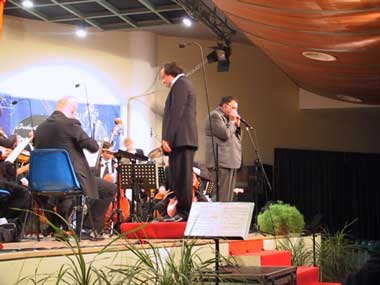
Musica Per L'Immagine was the idea of musician, Franco de Gemini. De Gemini is known for his piercing harmonica riffs on Ennio Morricone's Man With A Harmonica from Sergio Leone's Once Upon A Time In The West (C'era una Volta il West). In addition to this classic, he has performed on approximately 800 film soundtracks. For the past four decades, de Gemini has operated a music publishing company with his wife, Luciana, in Rome. His idea for this gathering was to celebrate the music that has memorably added a resonant texture to the dramatic storyline to international cinema. It was also an occasion for this group of artist to reunite and perform together once more. Throughout the weekend, de Gemini and the organizers of this event created a relaxed atmosphere for musicians, family, friends and spectators to meet and visit with each other.
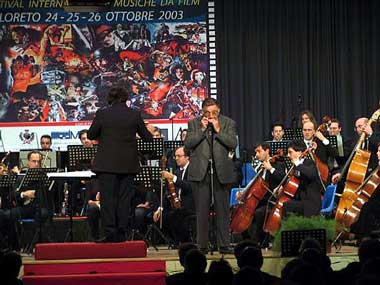
An all-star group of musicians and composers were in attendance. Along with de Gemini were Francesco de Masi, known for composing scores for several Italian Western films; Alessandro Alessandroni, the famed whistler, guitarist and vocalist on Ennio Morricone's scores for Sergio Leone's Dollar trilogy: A Fistful of Dollars (Per un Pugno di Dollari), For a Few Dollars More (Per Qualche Dollaro in Più), and The Good, the Bad, and the Ugly, Once Upon a Time in the West, and Fistful of Dynamite,; and Gianna Spagnolo who provided the exotic solos for several Morricone scores including the theme song for Navajo Joe. All four of these artists performed at the festival.
Two other giants of Italian film music made appearances at the festivities. Riz Ortolani attended the Friday lunch and the Friday evening performance. Ortolani will forever be remembered for writing with Nino Oliviero the worldwide hit song, More, which was featured in the movie, Mondo Cane. Norman Newell wrote the lyrics. The song was nominated for best song at the 1963 Academy Awards. It lost to Call Me Irresponsible, from the movie Papa's Delicate Condition.
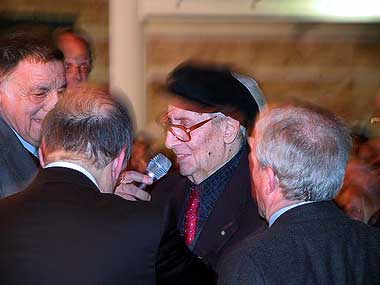
To everyone's surprise and delight, Carlo Rustichelli attended Saturday night's performance. Rustichelli composed numerous film scores and he holds a special place in the hearts of Italian film lovers because he wrote the music to some of Italy's earliest classic movies. Among his soundtrack scores is the music of Divorce Italian Style.
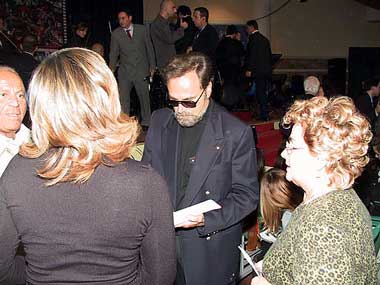
In addition to these musicians, the festival also brought to Loreto a few directors and actors who have made important contributions to Italian film. Director Enzo Girolami Castellari attended all three performances. He is considered to be Italy's best action film director. International movie star, Franco Nero, attended Saturday night's show. Nero appeared in many Italian Westerns. Actor John Phillip Law, another veteran of the Italian Western genre, made an appearance at Friday night's performance. Castellari's son, Andrea Girolami, who is a director with a promising future, also was in attendance. At the Saturday night concert, he presented his short film, Orme Rosse, starring Franco Nero. This film, which was also in the Italian Western genre, featured the music of Francesco de Masi with the musicianship of both Franco de Gemini and Alessandro Alessandroni.
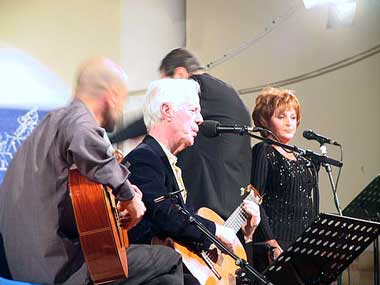
The Ensemble Theater Brass at Cinecittà under the direction of David Short performed Friday night to begin the three-night concert series at the Palacongressi auditorium. Mr. Short, originally from Cincinnati, is an accomplished trombonist and composer and has conducted orchestras throughout the world. The ensemble performed music from the Bud Spencer and Terence Hill films and the music of the notable composers Nino Rota, Leonard Bernstein, Francesco de Masi and John Williams.
The highlight of the evening was a tribute to Riz Ortolani. A video was shown of Ortolani conducting a full orchestra's performance of his song, More. After this presentation, de Gemini and the local organizers of the event gave him an award in recognition of his achievements in film music.
Saturday night featured a performance by the Orchestra Sinfonica I Virtuosi di Roma under the direction of Francesco de Masi. The orchestra performed a variety of film music written by Antoine Duhamel, de Masi, George Gershwin, Carlo Rustichelli, Nino Rota, Ennio Morricone and Marco Frisina. Alessandroni was the featured performer. Among the songs he performed were Titoli (from A Fistful of Dollars), For a Few Dollars More, Farewell to Cheyenne (from Once Upon a Time in the West) and I Figli Morti (from A Fistful of Dynamite). Another important moment of the evening was when the organizers honored Carlo Rustichelli for his work in cinema.
The concert series ended with a Sunday evening encore of the Orchestra Sinfonica under the direction of Francesco Santucci. Santucci is a young conductor from Perugia and studied music at Duke University and Juilliard School of Music. During the past two decades, he has performed with several internationally known musicians. To close this event, the orchestra performed music by John Williams, Antonio Carlo Jobim, Nino Rota and Ennio Morricone. The highlight of the evening was the orchestra's performance of Man with a Harmonica featuring Franco de Gemini on harmonica.
At the end of Sunday's show, there was a sense of a journey completed. A large scope of Italian music had been performed which reminded those in attendance that there is a special history in Italy's contribution to cinema music. The festival was an appreciation of great music from the past and a reminder that the roots of a great tradition in cinema have provided a strong base for more gems of cinema music to come.
Joeseph Pascale
(Photos by Joseph Pascale)